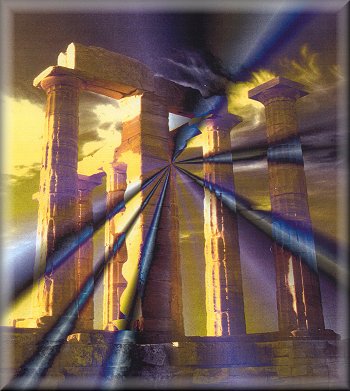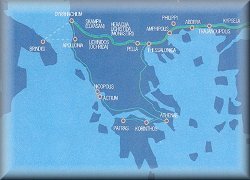
Thessaloniki in the Roman period

Thessaloniki, with its crucial geopolitical situation and as a prestigious urban center of cultural importance for all Macedonia, succeeded in imposing itself on the Romans who had conquered it. It was made capital of Macedonia (293 - 305 AD) and it later became the seat of Galerius, one of the four leaders who ruled the Roman Empire in the period known as the tetrarchy. In the same period with the founding of the first Christian church in the city - in about 50 AD by St Paul - Thessaloniki became the "golden gate" by which the new religion penetrated Europe and its church was the first of any size on European soil. In Galerius' time, the Roman officer Demetrius was put to death for refusing to renounce Christianity, and his martyrdom led to his becoming the patron of the city.
Thessaloniki attracted numerous artists and intellectuals from all over the Empire, and we know from inscriptions that have come to light during excavations that Greek was the language most widely used in the city.
The Romans defeat Perseus, last king of Macedonia, at Pydna in Imathia and conquer Macedonia.
Thessaloniki becomes the capital of the Roman province Macedonia after the defeat of a Macedonian uprising led by Andriscus and the final incorporation of the area into the Roman Empire.
After the Battle of Philippi, Thessaloniki becomes a "free city", and the help it had given Anthony and Octavian, victors in the battle, is rewarded by administrative and economic privileges
Foundation of the first Christian church, by St Paul, whose two Epistles to the Thessalonikians are regarded as being among the fundamental texts of the Christian religion.
Thessaloniki joins the Atticon Panhellenion, a kind of federal organization set up by Hadrian, the pro-Greek Roman Emperor, whose purpose in founding it, was to unite the Greeks.
Caesar Galerius chooses Thessaloniki as the capital of the four sections into which the Roman Empire had been devided under his rule, fine palaces are built in the city
Martyrdom of St Demetrius. The Diocletian persecution of the Christian also saw the deaths in the city of many saints.
 Under the Romans Thessaloniki was the administrative center of an entire province and during the first century BC developed into one of the most important cities in the Roman Empire. It also continued to be the metropolis od Macedonia. In the period of the Civil War, Thessaloniki was a "free city" with its own rules. It was also the seat of the Praetorian general of the Roman province of Macedonia, and as such it minted its own coins. This period of economic and cultural development was fostered by the Via Egnatia, which ran just a few kilometers outside the city, by the port, and by the economic and administrative privileges granted by the Romans.
Under the Romans Thessaloniki was the administrative center of an entire province and during the first century BC developed into one of the most important cities in the Roman Empire. It also continued to be the metropolis od Macedonia. In the period of the Civil War, Thessaloniki was a "free city" with its own rules. It was also the seat of the Praetorian general of the Roman province of Macedonia, and as such it minted its own coins. This period of economic and cultural development was fostered by the Via Egnatia, which ran just a few kilometers outside the city, by the port, and by the economic and administrative privileges granted by the Romans.
168 BC: 148 BC: 42 BC: 50 AD: 131/2 AD: 293 - 305 AD: 303 AD: